Popularity, trustworthiness and competence: YouGov charts public opinion at the very beginning of Johnson’s premiership
After winning 66% of the vote amongst the Tory membership, Boris Johnson was today elected leader of the party and will tomorrow be Britain’s new Prime Minister.
While Johnson got his new job by appealing to the party membership, his focus will need to shift to the views of the wider electorate if he wants to keep it.
Over the weekend YouGov conducted a detailed study into where the public currently stand on the politician who will tomorrow be the most powerful man in the country.
He is significantly less popular than when Theresa May took over as PM
The public has a far more negative view of the new Tory leader than they did of Theresa May when she took over the top job. Boris Johnson currently has a net favourability score of -27, with three in ten (31%) having a favourable view of him and nearly twice that number (58%) having a negative view of him.
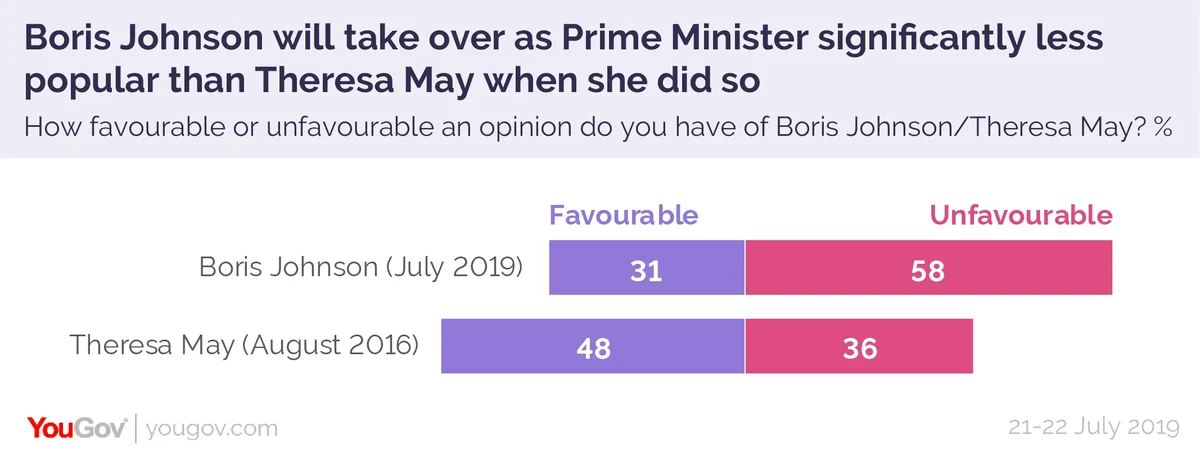
By comparison, when we first asked this question about Theresa May after she was elected to the position in the summer of 2016, 48% had a favourable view of her, compared to 36% who had an unfavourable view – a net score of +12.
That being said, Johnson’s favourability figures do at least represent an improvement over his predecessor’s current showing, with our most recent survey showing 25% with a favourable view of May and 62% having an unfavourable view for a net score of -37.
A good Mayor of London, but a bad Foreign Secretary
During this leadership campaign the frontrunner spent a lot of time talking up his reputation as Mayor of London, and a lot less time talking about his time as Foreign Secretary.
The data gives us some indication of why he might have been emphasising his earlier role. Just a quarter (26%) of the public think the new Conservative leader did a good job as Foreign Secretary, compared to nearly half (48%) who think he did a bad job.
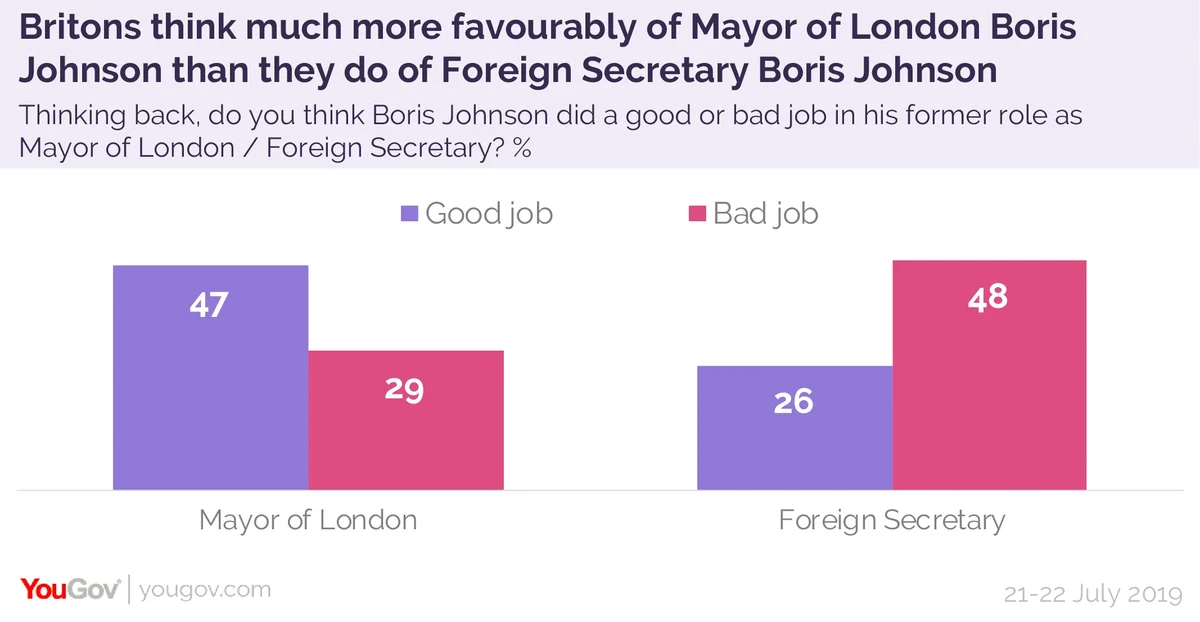
By comparison, nearly half (47%) think he did a good job as Mayor of London, compared to 29% who think he did a bad job.
Perhaps because of his difficult time as Foreign Secretary, the public are also concerned about the impact the new PM will have on the UK’s reputation around the world. Nearly half (46%) think he will worsen the UK’s image abroad, compared to 16% who think he will improve it. A quarter (24%) think he will make no difference either way.
A new type of Prime Minister, but not in a good way
It’s fair to say the public see “Boris” as a different type of politician. Half of Britons (52%) expect him to be “a completely new type of Prime Minister” compared to just a quarter (24%) who think he will be much like previous ones.
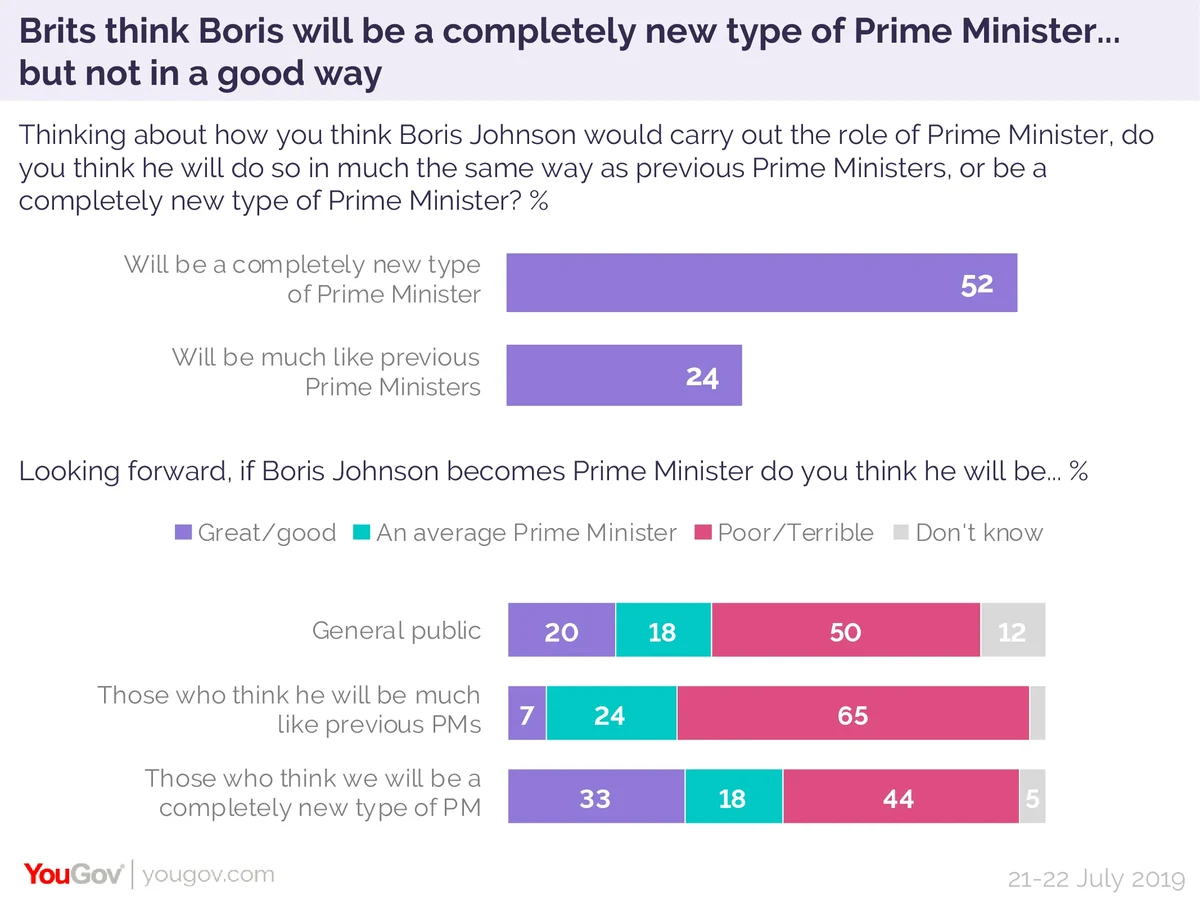
But different doesn’t mean good, with most of the public also having low expectations of Johnson’s ability to govern.
Just one in five (20%) expect him to be a good or great Prime Minister, compared to half (50%) who think he will be a poor or terrible one. Even amongst those who think he will be a new type of Prime Minister, 44% think he will be poor or terrible, compared to just 33% who think he will be good or great one.
A strong, likeable leader, but not one that can be trusted
When looking at how Boris Johnson might be different to his predecessors, it is also interesting to look at the kind of qualities and characteristics that the public associate with him.
On the positive side, he is perceived as someone who is more likeable (43%) than dislikeable (41%) and also more strong (41%) than weak (34%).
However, on most of the qualities we tested he tends to be seen more negatively. The most dramatic example of this is on trustworthiness, with just one in five (20%) thinking he is trustworthy compared to three times that number (58%) who think he is untrustworthy.
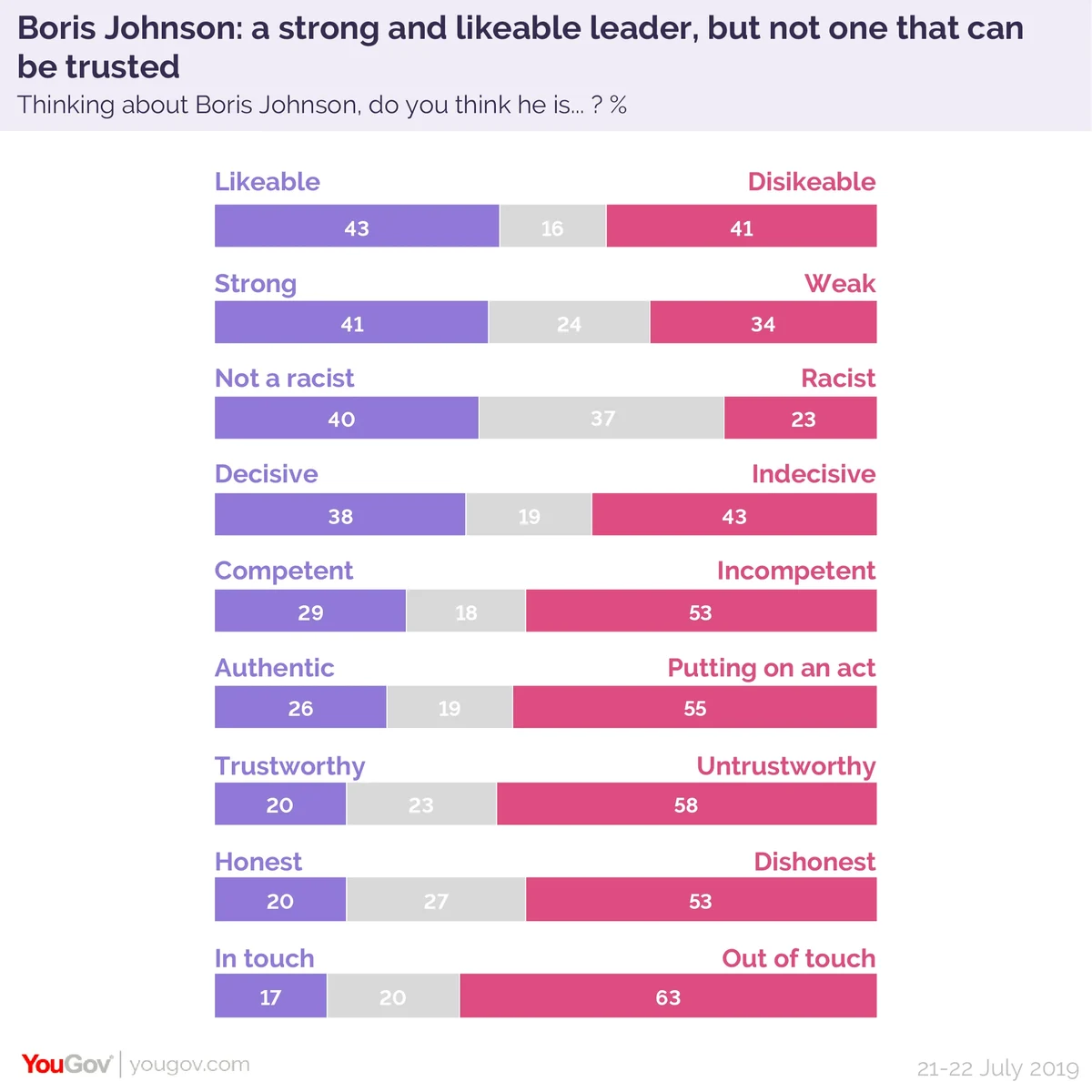
Britons also consider him to be more indecisive (43%) than decisive (38%) and far more think he is incompetent (53%) than competent (29%). When it comes to the concerns of ordinary people, significantly more think he is out of touch (63%) than in-touch (17%).
When asked to give a word they associate with the new Conservative leader, people that have a favourable view of Boris Johnson describe him as “charismatic”, “eccentric”, “flamboyant”, “different”, and “intelligent”.
The top five words associated with him by people who have an unfavourable view are “buffoon”, “idiot”, “liar”, “clown”, and “untrustworthy”.
Despite fierce debate caused by Johnson’s comments describing Muslim women wearing burkas as looking “like letter boxes", less than a quarter (23%) of people think he is racist, compared to 40% who think he is not.
If he was at Hogwarts, he would be in Slytherin
To dig deeper into how the public perceive the new Conservative leader, we also asked what Hogwarts house they think Boris Johnson would be put into by the sorting hat if he attended JK Rowling’s fictional school. By far most common view (at 42%) was that he belongs in Slytherin (which values ambition, cunning, leadership, and resourcefulness).
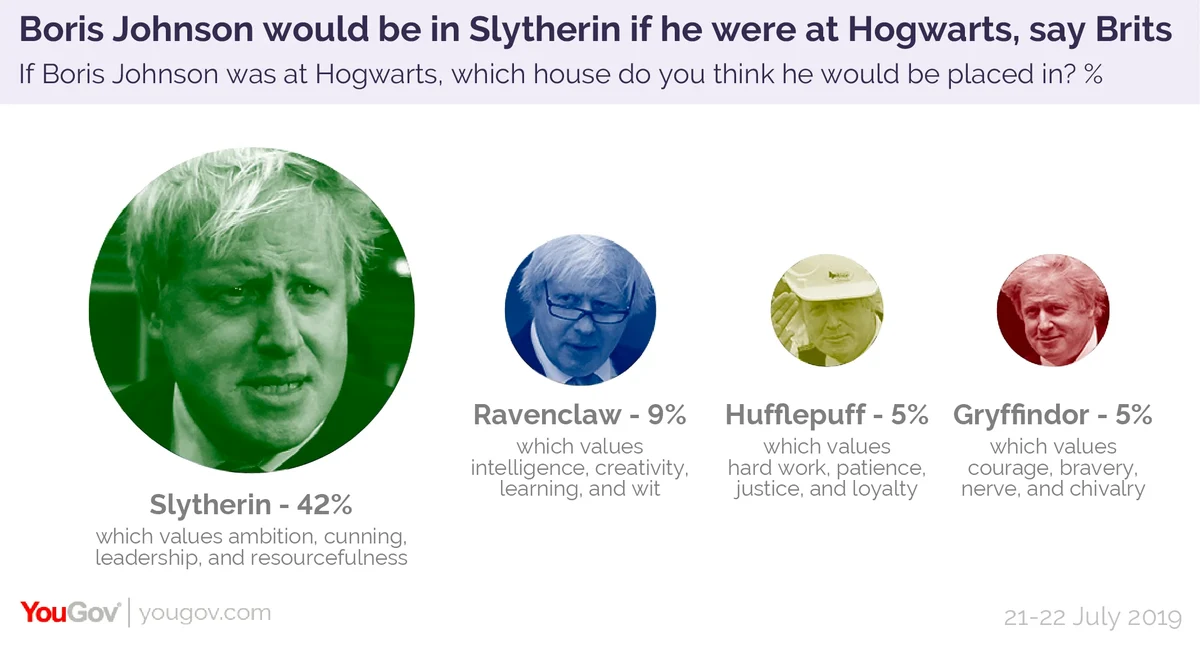
Even among those with a favourable view of Johnson the most common choice was still Slytherin (22%). They are, however, more likely than the population as a whole to place him in Ravenclaw (which values intelligence, creativity, learning, and wit), at 20% to 9%.
Just 5% of the public thought he would be placed in Hufflepuff (which values hard work, patience, justice, and loyalty) with another 5% saying Gryffindor (which values courage, bravery, nerve, and chivalry).
Perhaps it is no coincidence that, when asked which animal they think Boris Johnson is most similar to, a snake (the animal of Slytherin house) tops the list at 18%. Amongst those that have a favourable view of Boris Johnson, the animals that come top are a labrador (on 20%), bear (on 18%), and the very British bulldog (also on 18%).
Does Boris’s unpopularity matter?
Overall, there is definitely far more bad news in these numbers than there is good news for the new Conservative leader. By historic standards, Boris Johnson will be an unpopular new Prime Minister.
However, there are also reasons to believe that Johnson’s popularity levels might be less important than they have been for Prime Ministers gone by.
Firstly, whilst his own numbers aren’t good, his opponents’ are generally worse. The 31% who have a favourable view of Johnson is higher than the 27% who have a favourable view of Nigel Farage, the 9% who have a favourable view of Jo Swinson (because most people still haven’t heard of her) and the 18% who have a favourable view of Jeremy Corbyn.
In a head-to-head fight against the leader of the opposition over who would make the best Prime Minister, Boris leads Jeremy Corbyn by 34% to 20% (although they are both behind “not sure” on 42%).
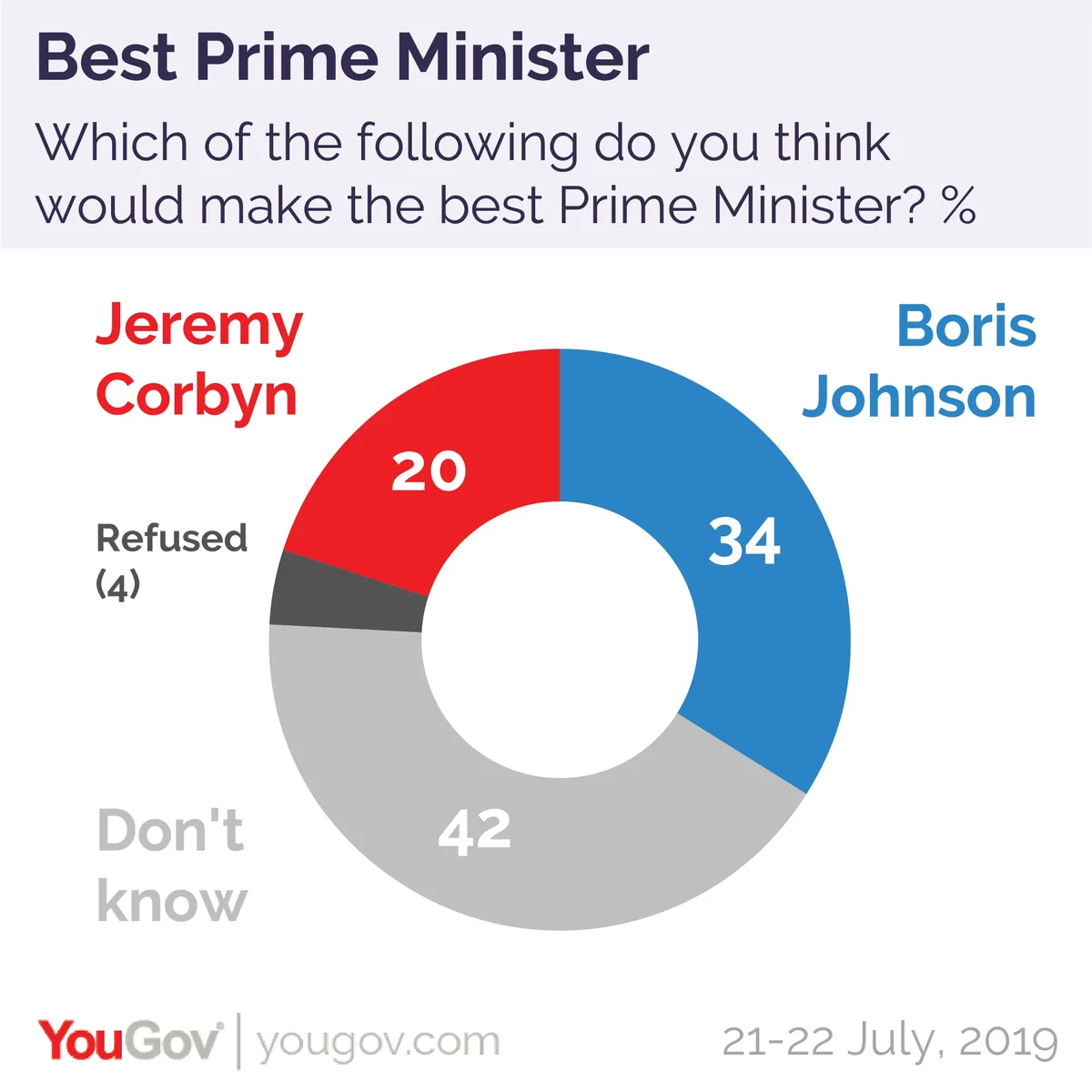
Secondly, whilst Boris’s overall numbers aren’t particularly positive, he does well amongst the key voters he needs to bring back into the Conservative fold. They key challenge to the Conservative Party is to win back the third of their voters that they have lost to the Brexit Party over the past few months.
And amongst these voters Boris is incredibly popular, with 71% of those who say they would currently vote for Nigel Farage’s insurgent party saying they have a favourable view of him. In fact, he has about the same levels of popularity amongst Brexit Party voters than amongst current Conservatives.
Finally, these numbers still have time to change before a general election takes place, and a lot depends on how he handles Brexit over the coming months.
At the moment, just one in five (19%) think it is likely he will be able to negotiate a new Withdrawal Agreement with the EU that Parliament can approve (64% think he won’t be able to), and just a third (33%) think he will take taken Britain out of the EU by the end of October (44% think it will be unlikely).
If Boris can prove the public wrong by taking Britain out of the EU by the end of October in a way that is considered successful, he will likely bring those Brexit Party voters back into the Conservative fold and stand a good chance of victory going into a subsequent election. But if he fails he could alienate the hard Brexiteers who are currently his core base, and these bad numbers could get even worse.
Either way, he will live and die based on how well he handles Brexit over the coming months, and we will continue to track the public’s perceptions of him while he does.




